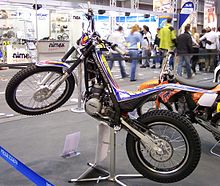Sherco
This article has multiple issues. Please help or discuss these issues on the talk page. (Learn how and when to remove these template messages)
|
 | |
 Sherco Trial 2.9 | |
| Industry | Motorcycle |
|---|---|
| Founded | 1998 |
| Fate | active |
| Headquarters | Nîmes, France |
Key people | Marc Tessier |
Sherco is a French motorcycle manufacturer, specialising in off-road motorbikes. Sherco are best known for their extremely popular trials bikes, although they also make enduro and supermoto bikes.
The company was founded in 1998, and currently has two production facilities. A factory in Caldes de Montbui, Spain, some 30 kilometres (19 mi) north of Barcelona is where the company's trials bikes are manufactured. Enduro and supermoto bikes are built at a factory in Nîmes, France.[1]
The name, Sherco, derives from the amalgamation of two words, Bultaco and Sherpa, that harks back to the company's origins. The Barcelona factory, that was founded in 1998, specializes in the trial category, while the French factory, which was established in 2003, specializes in the rest of the production.
It was 1999 before the first trials bike rolled of the production line. It brought together all the best components from its rival manufacturers. So good in fact was the initial design, that the main chassis design was not changed until 2006; 7 years after its conception, and the engine was not drastically changed until 2011, which in the fast changing world of trials motorcycle evolution, is a long time.

The Sherco trials range is available in a wide range of engine sizes, including: 80cc (called the 0.8), 125cc (1.25), 200cc (2.0), 250cc (2.5), 272cc (called the 2.9 for marketing purposes) and 300cc (3.0 Cabestany replica of 2010) 2-stroke machines. Sherco also introduced a 320cc (3.2) 4-stroke engine in 2005. Sherco added the prefix initials ST to the engine range in 2009 to signify the trials motorcycle range, rather than the SE enduro and SU supermoto bikes now available.
In 2006, Sherco modified the tuning of the 2.9, 272cc, model; making a more mellow throttle response for better grip in wet conditions. This was done by increasing the volume of the cylinder head combustion chamber (lowering the compression ratio) and reducing the cross section area of the transfer ports. Other changes including the new chassis (now painted black rather than chrome plated), new gearbox ratios and a new front fork manufacturer. All these changes made the 2006 Sherco more usable for more riders. 2006 also saw the introduction of a Cabestany replica 2.9 model with limited edition graphics.

In 2009, Sherco introduced the Sherco R; a commercially available version of Albert Cabestany's works machine available in 2.9 (2-stroke) and 3.2 (4-stroke) models, which, among other modifications, included: a titanium exhaust front pipe, high compression cylinder head, keihin carburettor and numerous carbon fibre components.
2010 saw a Sherco radically change the look of their trials motorcycles by relocating some of the motorcycle's key components. This lateral thinking saw the fuel tank and the air inlet box swap places, allowing the weight of the fuel to be lower down, lowering and moving the centre of gravity down and further back, while the relocated air box meant a cleaner supply of air for the engine. 2010 also saw Sherco bring back the Cabestany replica; last seen in 2006. Based on the 2010 bike, the Cabestany replica now had a 300cc engine, which had never been commercially available before (works machines only), a new Dellorto VHST 28mm carburettor, a new blue frame colour scheme and a titanium front exhaust pipe.
References[]
- http://issuu.com/magazineproduction/docs/trials_magazine_july_august_2010_ezine_public/4, issue 22, July–August 2010, p. 6
- ^ "Company - Sherco". Retrieved 6 December 2021.
External links[]
| Wikimedia Commons has media related to Sherco motorcycles. |
- Motorcycle manufacturers of France
- Vehicle manufacturing companies established in 1998
- Motorcycle manufacturers of Spain
- Motorcycle trials
- French brands